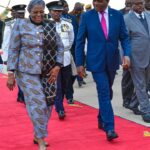U.S. President Donald Trump confronted South African President Cyril Ramaphosa during a high-stakes meeting at the White House on Wednesday, pressing contentious issues that have recently strained bilateral relations.
Central to the confrontation were Trump’s controversial claims alleging a so-called “white genocide” in South Africa. He accused the South African government of allowing violence against white citizens, particularly farmers, and of encouraging land seizures through what he termed “hateful rhetoric and government actions.”
South African officials have consistently rejected these allegations, arguing they are not only inaccurate but also dangerously misleading. The government maintains that while South Africa continues to grapple with high levels of violent crime, the majority of victims are black South Africans, not white. They further assert that the land reform process is being conducted within the confines of the law and is aimed at redressing centuries of historical injustice stemming from colonial rule and apartheid.
President Ramaphosa strongly rebutted Trump’s claims during the meeting, seeking to present a more nuanced understanding of the country’s socio-economic challenges and ongoing reconciliation efforts. His visit was also aimed at restoring diplomatic goodwill between the two nations—a relationship many analysts say has deteriorated to its lowest point since the end of apartheid in 1994.








